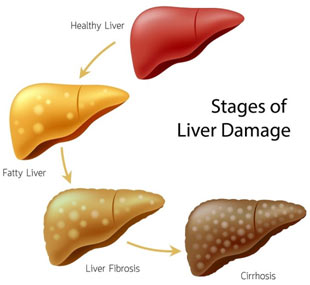Diseases of Liver in Humans
Liver disease can be inherited (genetic). Liver problems can likewise be caused by a variety of factors that harm the liver, such as viruses, alcohol use, and weight problems. With time, conditions that damage the liver can lead to scarring (cirrhosis), which can cause liver failure, a deadly condition. But early treatment may offer the liver time to heal.
Parasites and viruses can infect the liver, triggering swelling that reduces liver function. The viruses that cause liver damage can be spread through blood or semen, infected food or water, or close contact with an individual who is infected. The most typical kinds of liver infection are hepatitis infections.
Diseases in which your immune system attacks certain parts of your body (autoimmune) can affect your liver. An irregular gene acquired from one or both of your parents can cause different substances to develop in your liver, resulting in liver damage.
Details of a few diseases are given here.
Hepatitis
Hepatitis is a viral infection of your liver. It causes swelling and liver damage, making it tough for your liver to work as it should. There are 5 kinds of hepatitis:
Hepatitis A is generally spread out through contact with infected food or water. Symptoms may clean up without treatment, however, recovery can take a few weeks.
Hepatitis B can be acute (short-term) or chronic (long-term). It’s spread out through bodily fluids, such as blood and semen. While liver disease B is treatable, there’s no remedy for it. Early treatment is crucial to avoid problems, so it’s finest to get routine screenings if you’re at risk.
Hepatitis C can likewise be intense or persistent. It’s frequently spread out through contact with blood from someone with hepatitis C. While it typically does not cause symptoms in its early stages, it can result in long-term liver damage in its later stages.
Hepatitis D is a severe kind of liver disease that just develops in people with hepatitis B– it can’t be contracted by itself. It can also be either acute or chronic.
Hepatitis E is usually caused by drinking infected water. Normally, it cleans up by itself within a few weeks without any lasting complications.
Autoimmune liver hepatitis
Autoimmune hepatitis inflames your liver. It can lead to other disorders and even liver failure. It strikes girls and women more often than boys or men.
Primary biliary cholangitis
Primary biliary cholangitis attacks tiny tubes in your liver called bile ducts. They carry bile, a chemical that helps you absorb food. When the ducts are injured, the bile backs up inside your liver and scars it. Females come down with this more often than males.
Primary sclerosing cholangitis
Primary sclerosing cholangitis scars your bile ducts, and it can eventually obstruct them. The bile builds up inside your liver, which makes it harder for your liver to work. It may cause liver cancer, and you might sooner or later need a liver transplant. Males are more likely than ladies to get it.
Fatty liver disease
Fat buildup in the liver can cause fatty liver disease.
There are two types of fatty liver disease:
- Alcoholic fatty liver disease, which is triggered by heavy alcohol intake, and
- Non-alcoholic fatty liver disease, which is caused by other factors specialists are still trying to understand.
Left untreated, both types of fatty liver disease can trigger liver damage, causing cirrhosis and liver failure. A Diet plan and other lifestyle changes can typically enhance signs and reduce your threat of issues.
Liver cancer
Liver cancer affects women more often than men. Your physician might call it hepatocellular carcinoma. Liver cancers very first develop in your liver. If cancer begins in other places in the body however spreads to the liver, it’s called secondary liver cancer.
The most common type of liver cancer is hepatocellular cancer. It tends to develop as numerous small sports of cancer in your liver, though it can also begin as a single tumor. Complications of other liver illnesses, particularly those that aren’t treated, might add to the development of liver cancer.
Hemochromatosis
Hemochromatosis makes your body store up excessive of iron from your food. The additional iron develops in your liver, heart, or other organs. It can cause lethal conditions such as liver diseases, cardiovascular disease, or diabetes.
Wilson’s Disease
Wilson’s disease triggers your liver to absorb copper instead of releasing it into your bile ducts. Ultimately, your liver may become too damaged to save more copper, enabling it to take a trip through your bloodstream and damage other parts of your body, including your brain.
Liver failure
Chronic liver failure usually takes place when a considerable part of your liver is harmed and can’t work correctly. Usually, liver failure related to liver disease and cirrhosis happens slowly.
Symptoms include:
- jaundice
- diarrhea
- fatigue and weakness
- queasiness
This might occur because of an overdose of acetaminophen, infections, or because of prescription drugs.

